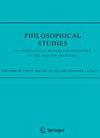价值取向代理的语言死区,自然的和人为的
IF 1.3
1区 哲学
0 PHILOSOPHY
引用次数: 0
摘要
人工智能(AI)的价值一致性问题询问我们如何确保“价值”——即:人工系统的目标功能与人类的价值观是一致的。在本文中,我认为语言交际是稳健的价值取向的必要条件。我讨论了这一说法的真实性对那些试图确保人工智能系统价值一致性的研究项目的影响,或者,更崇高地说,那些寻求设计强大有益或道德的人工代理的项目。本文章由计算机程序翻译,如有差异,请以英文原文为准。
The linguistic dead zone of value-aligned agency, natural and artificial
The value alignment problem for artificial intelligence (AI) asks how we can ensure that the “values”—i.e., objective functions—of artificial systems are aligned with the values of humanity. In this paper, I argue that linguistic communication is a necessary condition for robust value alignment. I discuss the consequences that the truth of this claim would have for research programmes that attempt to ensure value alignment for AI systems—or, more loftily, those programmes that seek to design robustly beneficial or ethical artificial agents.
求助全文
通过发布文献求助,成功后即可免费获取论文全文。
去求助
来源期刊

PHILOSOPHICAL STUDIES
PHILOSOPHY-
CiteScore
2.60
自引率
7.70%
发文量
127
期刊介绍:
Philosophical Studies was founded in 1950 by Herbert Feigl and Wilfrid Sellars to provide a periodical dedicated to work in analytic philosophy. The journal remains devoted to the publication of papers in exclusively analytic philosophy. Papers applying formal techniques to philosophical problems are welcome. The principal aim is to publish articles that are models of clarity and precision in dealing with significant philosophical issues. It is intended that readers of the journal will be kept abreast of the central issues and problems of contemporary analytic philosophy.
Double-blind review procedure
The journal follows a double-blind reviewing procedure. Authors are therefore requested to place their name and affiliation on a separate page. Self-identifying citations and references in the article text should either be avoided or left blank when manuscripts are first submitted. Authors are responsible for reinserting self-identifying citations and references when manuscripts are prepared for final submission.
 求助内容:
求助内容: 应助结果提醒方式:
应助结果提醒方式:


